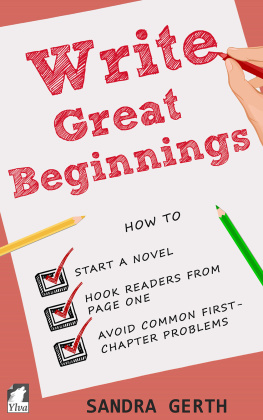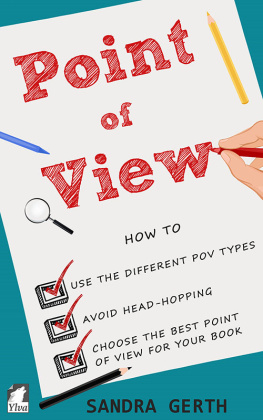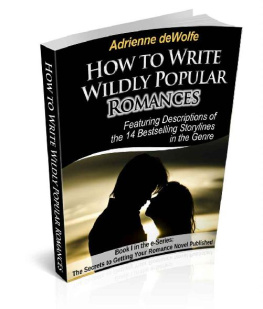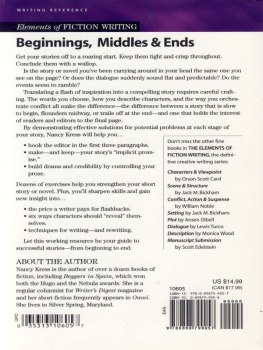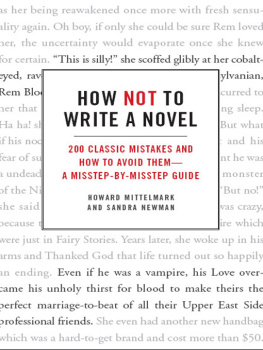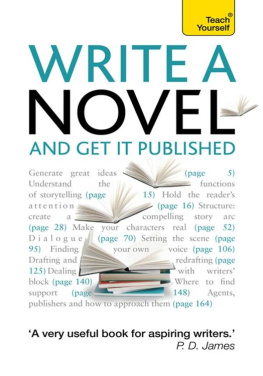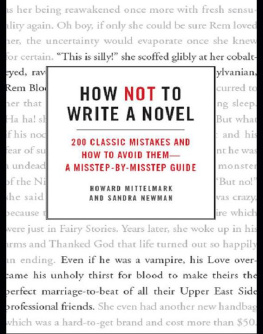Table of Contents
Books in the Writers Guide Series
Goal Setting for Writers
How to set and achieve your writing goals, write a book, and become a successful author
Time Management for Writers
How to write faster, find the time to write your book, and be a more prolific writer
Show, Dont Tell
How to write vivid descriptions, handle backstory, and describe your characters emotions
Point of View
How to use the different POV types, avoid head-hopping, and choose the best point of view for your book
Write Great Beginnings
How to start a novel, hook readers from page one, and avoid common first-chapter problems
PART I Introduction
1. The importance of the opening
Why writing a great beginning is crucial
I have a feeling you already understand that the beginning of your book is important; otherwise, you probably wouldnt have bought this book. But the beginning isnt just important. Its the most important part of your book. Sure, its essential to write a captivating middle and a satisfying ending too, but its the opening that will make an editor decide to accept your manuscript for publication. Even if youre an indie author who self-publishes and doesnt have to impress agents or editors, writing a great beginning is still vital because you do have to impress readers as they buy or dont buy your book based on its opening.
Your opening is the first thing literary agents, acquisition editors, and readers will see of your story. They will judge your book and your writing skills in general based on the first few pages they read. This is your chance to make a good first impression. More often than not, you wont get another.
If your beginning is weak, it doesnt matter how brilliantly written the rest of your book is. Readers, agents, and editors will never find out about the clever plot twist in chapter 11, your action-packed showdown, or your moving ending because they will stop reading long before they get to the good parts.
YOUR BEGINNING IS A MARKETING TOOL
The first few pages of your book are actually a marketing tool. As award-winning crime novelist Mickey Spillane said, The first chapter sells the book. Think about how readers make the decision to buy a book. For most readers, it goes like this: The cover or title of the book draws their attention, so they read the description, which is commonly called the blurb . If the blurb sounds interesting, they will usually open the book to the first page or, if they are shopping at an online bookstore, click on the sample. On most online retailer sites, that sample contains the first ten percent of the book, so that part of the story is especially crucial. If readers get to the end of the excerpt and find themselves hooked, theyll buy the book. If the beginning doesnt capture their attention, theyll move on and buy another book.
Nowadays, readers attention spans are short. They wont patiently read several chapters, waiting around for something interesting to happen. You only have a page or two to convince readers to buy your book or editors to accept your manuscript.
BEGINNINGS ARE HARD TO WRITE
Yet many writers struggle to create a great opening for their book. Writing a riveting beginning is one of the hardest parts of the writing process for many authors. They agonize over their opening chapters; they rewrite, revise, and polish them over and over, without ever feeling completely satisfied with their story beginning.
Other writers are convinced they have written the perfect opening, only to be rejected by a literary agent or an editor or have the book not sell well.
If you are struggling with your opening chapters or are aiming to write a book that will be accepted by agents and publishers and eagerly bought by readers, this guide is for you.
WHAT THIS BOOK WILL TEACH YOU
As the senior editor of a small publishing house, Im in charge of reading submissions and deciding what manuscripts are accepted for publication. We reject manuscripts for a lot of different reasons, but most of the time, its because the opening failed to capture our interest or the writer committed one of the mistakes that are common in opening chapters: a beginning that is too slow, lacks conflict, or starts in the wrong place.
During the course of this book, Ill teach you how to avoid these mistakes and how to write an opening that will keep agents, editors, and readers reading.
Whether youre a novice writer working on your first book or an established author who has already published multiple novels, this guide will help you:
Decide where to start your book
Write a kickass first line
Hook your readers from the very first page
Avoid openings that are boring, clichd, or misleading
Decide whether opening your book with a prologue is a good idea
Get your readers emotionally involved in your story as soon as possible
Introduce your characters and your setting
Pick a point of view and tense for your story
Incorporate backstory and descriptions without stopping the momentum of your story
Discover what types of openings to avoid
Understand the three-act structure and the elements of the first act
Create chapter endings that will make readers keep reading
HOW TO GET THE MOST OUT OF THIS BOOK
Each chapter of this book ends with practical exercises that will help you apply what you are learning to your own manuscript.
While youre reading this book, I suggest you stop after every chapter and do the exercises. I know its tempting to skip this step, thinking youll come back and do the exercises later, but if you are anything like me, you might be too busy to read the book a second time. So take the time to work on the exercises while everything is fresh in your mind.
Print out the first three chapters of your manuscript or set up a file in your favorite writing app, and do the exercises as you finish each chapter.
By the time you get to the end of this guide, Im confident that youll have a beginning that will hook agents, editors, and readers alike.
A NOTE ON THE EXAMPLES I USE
A few of the examples I use throughout this book are from my own novels, written under my pen name, Jae (https://jae-fiction.com). I do that not because I think my novels are the best ever but because I know them best, and I can quote from them as much as I want without violating anyones copyright or humiliating a fellow writer for mistakes theyve made.
I will also use examples not just from popular books but also from well-known movies. The same storytelling principles apply to both novels and movies, and I want to double my chances of you being familiar with some of the examples Im using. If you havent seen the movies or read the books and still want to do so, you might want to skip the example to avoid spoilers.
A NOTE ON PRONOUNS
Fiction is as diverse as life. You might be writing about a character who identifies as female, male, nonbinary, or something else entirely. Throughout this book, Ill use they/them/their as a singular, gender-neutral pronoun unless Im talking about a specific character whose pronouns are he/his or she/her .
Happy reading and writing!
Sandra Gerth
EXERCISE #1:
The next time you are looking for a book to read, browsing a bookstore, a library, or an online retailers site, observe yourself. How much of a book do you read before you decide to buy or not buy it?

